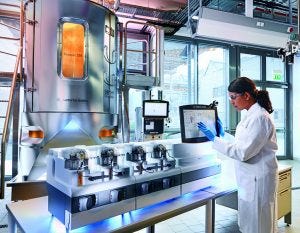Voices of Biotech
Podcast: MilliporeSigma says education vital to creating unbreakable chain for sustainability
MilliporeSigma discusses the importance of people, education, and the benefits of embracing discomfort to bolster sustainability efforts.
December 11, 2017
Sponsored Content
 The development and launch of new biopharmaceutical products is a very challenging and risky process. Sponsors must get their products into clinical testing as quickly as possible to beat their competition and take the greatest share of the market. Yet that need for speed must not lead to companies launching products with inefficient manufacturing processes that ultimately will leave them vulnerable to attack from low-cost competition. Single-use systems have been a significant enabling technology for companies developing new biologics because of their inherent flexibility and low upfront costs, which help mitigate financial risk during process development.
The development and launch of new biopharmaceutical products is a very challenging and risky process. Sponsors must get their products into clinical testing as quickly as possible to beat their competition and take the greatest share of the market. Yet that need for speed must not lead to companies launching products with inefficient manufacturing processes that ultimately will leave them vulnerable to attack from low-cost competition. Single-use systems have been a significant enabling technology for companies developing new biologics because of their inherent flexibility and low upfront costs, which help mitigate financial risk during process development.
As the technology has matured, more companies are becoming interested in widespread adoption of single-use systems even in commercial production settings. That would allow them to take advantage of the same flexibility of single-use technology while creating agile manufacturing networks that can respond to variations in demand, readily produce multiple products with fast changeovers, and facilitate new product introductions in the future.
Over many years, Sartorius Stedim Biotech (SSB) has demonstrated leadership in single-use technologies for biomanufacturing. We have gained considerable expertise from working with the world’s foremost biopharmaceutical companies and have obtained considerable insight into the needs of the bioprocess industry. This has driven us to invest in detailed characterization of the materials and processes we use to provide our clients with highly robust single-use systems underpinned by equally robust supply chains.
As you can see from this report, the analyses we have performed are helping to ensure that the materials we use are compatible with our customers’ biological products and cell lines. The original research we have conducted into the mechanisms by which microbial ingress can occur is helping us detect, avoid, and eliminate leaks within single-use platforms to provide customers with the highest levels of confidence when they install our systems into applications that are critical to patient safety.
We are proud to have the industry’s most comprehensive offering of single-use technologies and services. They allow for end-to-end processing of monoclonal antibodies (MAbs), vaccines, antibody–drug conjugates (ADCs), and regenerative medicines at commercial scales — from out-of-freeze through final fill and finish. SSB will support you during every phase of the development and implementation of these standardized platforms with teams of experts such as our process development consultants, application specialists, process engineers, and validation services. Biomanufacturers that install our single-use platforms will benefit from an unprecedented ability to control critical process parameters thanks to our novel process analytical technologies (PAT) that allow for real-time, on-line process monitoring and our data analytics software for predictive bioprocess control.
Advances in single-use production platforms are expediting their adoption into commercial biologics facilities. Biopharmaceutical companies are gaining a competitive edge with highly optimized and flexible processes that they can implement rapidly, secure in their knowledge that the supply of necessary production technologies and materials will be assured. When combined with SSB’s initiatives in intensified and continuous bioprocessing, these will allow the bioprocess industry’s single-use facilities of the future to provide the highest production throughputs at the lowest costs. •
Nick Hutchinson is technical content manager at Sartorius Stedim Biotech.
You May Also Like